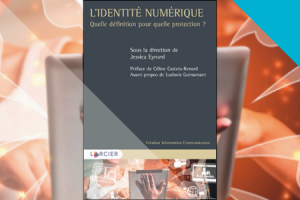> Download the executive summary #1 [1]
The VP-IP research Chair provides a new content format: the executive summary.
This first issue summarises the arguments developed by Claire Levallois-Barth in her article "For the recognition of a right to multiple digital identities".
 This 18-page article was published in December 2020 in a book published by Editions Larcier following the Study Day of the Institute of Private Law, University of Toulouse Capitale (France): "L'identité numérique : quelle définition pour quelle protection"(Digital identity: what definition for what protection?) of 12 December 2019.
This 18-page article was published in December 2020 in a book published by Editions Larcier following the Study Day of the Institute of Private Law, University of Toulouse Capitale (France): "L'identité numérique : quelle définition pour quelle protection"(Digital identity: what definition for what protection?) of 12 December 2019.
Executive summary #1: Calling for the recognition of a right to multiple digital identities
Civil identity, real identity, personal identity, biological identity, professional identity, civic identity.
Such possible identities, whether forced or desired, highlight the need to ascertain that an individual actually is who he or she claims to be or who one believes him or her to be. Identities are compelling us to define a new social structure that relies on legal acts, especially, at the European level, acts on means to identify people at borders, on electronic identificationi or on the security of EU citizens’ identity cards. At the French level, institutions involved in this debate, i.e., the inter-ministerial mission on secured digital identity solutions, the French Digital Counciliv and the National Assembly, confirm the importance of such challenges.
Among the topics addressed, we would like to focus on the issue of users’ control over their identities and on the difficulties in defining the notion of digital identity. In philosophy, one way to address such issue is to distinguish between the idem and ipse identities. ‘[T]he idem identity corresponds to a view on the individual from the outside, which treats the individual as a sum of stable characteristics. The ipse identity [...] corresponds to the individual as he or she relates to him/herself.’vi Law, on the other hand, uses an objective approach by defining the concept of ‘identity’ as ‘what makes an individual him- or herself and not another; by extension, what allows to recognize and distinguish him or her fromothers; [...] the set of characteristics that allow to identify him or her’.
Yet, this does not mean digital identity is civil identity transposed into cyberspace. The exponential increase in the types of attributes made possible by dematerialisation thus highlights the need to refer not to a digital identity, but indeed to digital identities. While our identities are constructed and attributed by public and private actors, we should not lose sight of the need to identify the conditions for individuals to act autonomously for them to be able to define by themselves the way they intend to present themselves to others (II). Taking both aspects into account – objective and subjective identity – is of utmost importance from our point of view. This distinction, to us, calls for the recognition of a right to multiple identities.
To continue your reading, we invite you to download [1] the executive summary, a new format provided by the VP-IP Research Chair.
Claire Levallois-Barth, Senior Lecturer in Law at Télécom Paris School, Coordinator of the VP-IP research Chair
[1] Download the executive summary #1
Executive summary from the article for a book published by Editions Larcier in December 2020 following the Study Day of the Institute of Private Law, University of Toulouse Capitale (France): L'identité numérique : quelle définition pour quelle protection?, 12 Dec. 2019.
